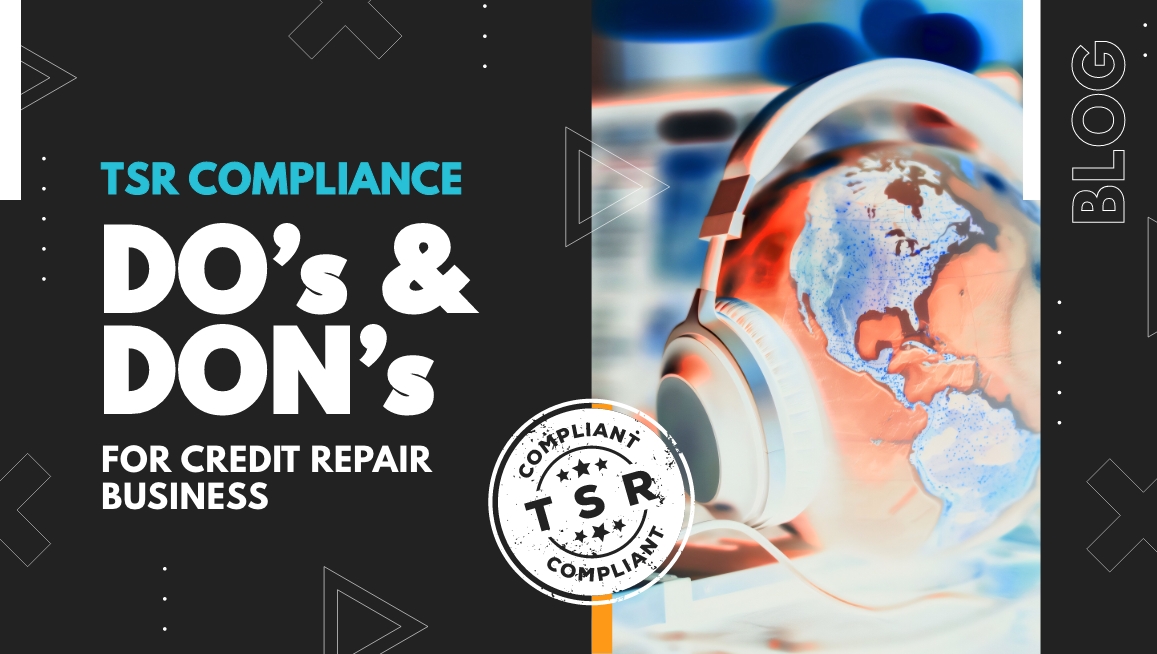TSR Compliance: Do’s and Don’ts for Credit Repair Business
by Almas Tariq
October 4, 2024
06:41 PM

Running a credit repair business requires more than just helping clients improve their credit scores. It demands strict adherence to a range of regulations, including the Telemarketing Sales Rule (TSR). This rule, enforced by the Consumer Financial Protection Bureau (CFPB), is designed to protect consumers from deceptive telemarketing practices. For credit repair businesses, non-compliance with the TSR can lead to severe penalties, legal action, and even business shutdowns.
To ensure your credit repair business remains compliant with the TSR, it’s crucial to follow a set of best practices. In this blog, we will provide a comprehensive checklist of Do’s and Don’ts for TSR compliance, specifically tailored to credit repair companies. By adhering to these guidelines, your business will be better protected from fines, disputes, and reputational damage.
Let’s dive into the essential practices you need to follow to ensure that your business not only complies with the TSR but also thrives in the credit repair industry.
Don’ts: Practices to Avoid If Charging Advance Fees
Avoiding certain practices is the first step to staying compliant with the Telemarketing Sales Rule. Many businesses fall into common traps that lead to TSR violations, especially when charging advance fees. These practices could end up costing your business in terms of both finances and reputation. Let’s explore the key practices to avoid:
Do Not Display Your Phone Number in Marketing
One of the core restrictions of the TSR is limiting telemarketing communications. This includes displaying your phone number in marketing materials. The rule is clear: when charging advance fees, credit repair businesses must avoid phone-based communication in their marketing strategy.
- Remove Phone Numbers from All Marketing Channels: You should ensure that your business phone number is not displayed on your website, landing pages, social media accounts, or in any form of advertisements. This includes not only digital platforms but also offline advertising, such as billboards or TV commercials.
- Avoid Phone-Related Call-to-Actions (CTAs): Any marketing material that encourages potential clients to call your business directly is a violation of the TSR. This includes CTAs like “Call us now for more information” or “Speak with a credit specialist today.” Instead, opt for CTAs that direct prospects to your website’s sign-up form or information page, where they can interact with your services without making a phone call.
Ignoring these rules could quickly put your business in the crosshairs of the CFPB, leading to fines and other penalties. Therefore, be sure to audit your marketing materials regularly to ensure compliance with this aspect of the TSR.
Do Not Conduct Phone-Based Sales Before Charging Fees
The TSR places strict restrictions on how businesses interact with potential clients over the phone. This is particularly important for credit repair businesses, as many services are offered through consultation and follow-up. However, if you charge advance fees, phone-based sales can quickly become a violation of the TSR.
- No Cold Calls or Unsolicited Sales Calls: If you charge advance fees for credit repair services, you are prohibited from initiating or engaging in phone calls with prospects before they officially become paying clients. Even if a lead requests a callback, engaging them over the phone before they agree to pay for services is non-compliant.
- Don’t Discuss Services on the Phone Before a Formal Agreement: It’s crucial that you avoid discussing specific credit repair plans, credit audits, or offering any consultation over the phone before a client has signed a formal agreement with your business. All communications must be in compliance with the TSR, and any deviation can result in significant legal trouble.
- No Outsourcing Phone-Based Lead Generation: Many businesses try to outsource telemarketing to third-party call centers or hire virtual assistants to conduct phone outreach. This is risky under the TSR. If your business charges advance fees, even outsourcing telemarketing is considered a violation.
To avoid these pitfalls, focus on non-phone-based communication channels for your sales and onboarding processes. This ensures compliance and protects your business from potential lawsuits or penalties.
Avoid Using Non-Compliant “Loopholes”
Some businesses attempt to find workarounds to the TSR, thinking they can use loopholes to sidestep the rules. However, these tactics often lead to compliance violations and could severely damage your business’s credibility and financial stability.
- Do Not Offer “Free” Credit Repair Services to Upsell Later: Offering free services with the intention of upselling paid credit repair services down the line is considered a deceptive practice under the TSR. Clients should not be lured with “free” services that come with hidden fees or upsells.
- Avoid Misleading “Voluntary Contributions”: If you intend to charge clients for credit repair services, do not label fees as “voluntary contributions.” Unless these fees meet legal standards, such as being tax-deductible donations, this tactic is likely to be considered non-compliant.
- No Backdoor Sales Through Credit Audits: Many businesses attempt to offer credit audits or assessments over the phone as a backdoor to selling credit repair services. The TSR clearly states that this practice is non-compliant. All sales communications should follow TSR regulations, and no attempts should be made to circumvent these rules.
Avoiding these so-called loopholes ensures that your business remains on the right side of the law and builds trust with your clients.
Do’s: Best Practices for Ensuring TSR Compliance
While it’s important to avoid non-compliant practices, it’s equally crucial to follow best practices that keep your business aligned with the TSR. Here are the essential Do’s for ensuring that your credit repair business remains compliant.
Use Non-Telemarketing Communication Methods
To stay compliant with the TSR, your business should adopt non-telemarketing methods for client communication and lead generation. This allows you to effectively engage with prospects while adhering to the TSR’s strict regulations.
- Create Informative Online Content: Instead of relying on phone consultations, create detailed sales videos or tutorials that explain your services. These videos can be embedded on your website, landing pages, or shared via social media platforms. This keeps your communication compliant while still providing prospects with valuable information.
- Engage Clients via Social Media Messaging: Social media platforms like Facebook Messenger, Instagram Direct, and WhatsApp offer an alternative to telemarketing. You can connect with prospects, share success stories, and answer their questions via direct messaging without violating TSR rules.
- Implement Live Chat on Your Website: A live chat feature on your website allows visitors to ask questions in real time. This method provides the immediate response that phone consultations offer without engaging in telemarketing. Additionally, chat logs can be stored for future reference, ensuring a transparent communication process.
By leveraging these non-phone-based communication methods, you keep your business compliant while still engaging effectively with potential clients.
Automate Your Sales Process
Automation can be a lifesaver when it comes to ensuring compliance with the TSR. By automating parts of your sales process, you can minimize human error and stay within the boundaries set by the TSR.
- Implement a Credit Repair CRM: Using a credit repair business CRM like ScoreCEO can help automate many aspects of your sales process, from lead capture to client onboarding. With a CRM, clients can sign up for services online, review terms and conditions, and pay without ever needing to engage in a phone call. This reduces the risk of violations.
- Use Embedded Checkout Forms: Another way to ensure compliance is by integrating embedded checkout forms or “buy now” buttons on your website. This enables clients to sign up and pay for services securely, without the need for phone-based consultations. Your CRM can track these transactions to ensure all payments are collected after services are rendered, keeping your business compliant.
- Non-Telemarketing CTAs: Instead of directing leads to call your business, create CTAs that guide prospects to self-service sign-up forms. For example, use phrases like “Learn more” or “Get started today” to direct clients to your website’s sign-up page, rather than prompting them to call.
Automation not only makes your business more efficient but also ensures that your sales process remains fully compliant with the TSR.
Conduct Regular Audits
Compliance isn’t something you can achieve once and forget about—it requires ongoing attention. Regular audits of your business processes, marketing strategies, and client interactions are critical to staying compliant with the TSR.
- Audit Your Marketing Materials: Review your marketing content periodically to ensure compliance with the TSR. This includes websites, landing pages, email campaigns, and social media posts. Are you directing clients to call your business? Do any of your CTAs encourage phone-based interaction? If so, update these materials immediately.
- Use Credit Repair Software for Compliance Audits: Credit repair business software like ScoreCEO can help automate compliance checks. These tools track client interactions, document payment schedules, and store important records, ensuring that all aspects of your business meet TSR standards. By using a CRM, you also simplify the auditing process by having all client records in one centralized location.
- Regularly Review Client Interactions: Keep a close eye on how your team interacts with clients, both in writing and over the phone (where applicable). Ensure all communications follow TSR guidelines and charge no advance fees before rendering services.
Conducting regular audits will help catch potential compliance issues early, before they escalate into costly violations.
Educate Your Team
One of the most important aspects of maintaining compliance with the TSR is ensuring that your employees are fully educated on the regulations. A well-trained team is less likely to make costly mistakes that lead to violations.
- Provide Ongoing Compliance Training: Regular training sessions on TSR compliance and best practices are essential. Make sure your staff understands the importance of avoiding telemarketing and adhering to the advance fee ban. These training sessions should be held regularly to ensure that all team members are up-to-date with the latest rules and regulations.
- Include Compliance Training in Employee Onboarding: When bringing on new hires, make TSR compliance a core part of their onboarding process. This ensures that from day one, they understand the legal implications of their actions and how to maintain compliance in their roles.
- Host Periodic Compliance Workshops: As rules and regulations evolve, it’s crucial to keep your team informed. Host periodic workshops or webinars to update your employees on any changes in TSR regulations or new compliance tools that your business may be adopting.
An educated team is a compliant team. By investing in training and education, you reduce the risk of non-compliance and build a culture of accountability within your business.
The Importance of TSR Compliance in Protecting Your Business
TSR compliance isn’t just about following the rules—it’s about protecting your business from the financial and legal risks associated with non-compliance. The consequences of failing to comply with the TSR can be severe, including penalties, lawsuits, and damage to your reputation.
-
Financial Penalties and Legal Consequences
The CFPB has imposed significant fines on credit repair companies that fail to comply with the TSR. These fines can range from thousands to millions of dollars, depending on the severity of the violations. Additionally, the CFPB may require businesses that charge advance fees without providing services first to refund those fees to clients, further straining their financial resources.
In some cases, clients may take legal action against your business, resulting in costly lawsuits that drain your time, money, and focus. Even if you win the legal battle, the negative attention and legal costs can be overwhelming.
-
Damage to Reputation
Your reputation as a credit repair business is one of your most valuable assets. Non-compliance with the TSR can severely damage that reputation, leading to a loss of client trust. Once a business violates consumer protection laws, it faces increasing difficulty in winning back clients or attracting new ones.
Potential clients often read online reviews before choosing a credit repair company. If your business fails to comply, negative reviews and word-of-mouth quickly spread, further damaging your ability to grow.
-
Client Loss Due to Disputes
Non-compliance with the TSR often leads to credit repair disputes. Clients who feel misled or overcharged are likely to file complaints, leading to disputes that can escalate into legal issues. Each dispute not only affects your current relationship with that client but also spreads negative word-of-mouth that impacts future client acquisition.
For this reason, prioritizing compliance is key to maintaining positive relationships with clients and ensuring long-term business growth.
Conclusion
Ensuring compliance with the Telemarketing Sales Rule (TSR) is essential for protecting your credit repair business from penalties, legal issues, and reputational damage. By following the Do’s and Don’ts laid out in this checklist, your business can stay compliant, build trust with clients, and avoid costly fines.
Invest in credit repair business software and CRMs to automate compliance processes, conduct regular audits, and educate your team on best practices. TSR compliance is not just a regulatory requirement—it’s a smart business decision that ensures long-term success.
By staying compliant, you protect not only your business but also your clients, fostering an environment of trust, transparency, and growth.
References:
Table of Contents
Explore More Insights
Dive deeper into a wealth of knowledge. Discover a multitude of articles covering diverse topics, expert perspectives, and the latest trends. Feed your curiosity and expand your understanding.



